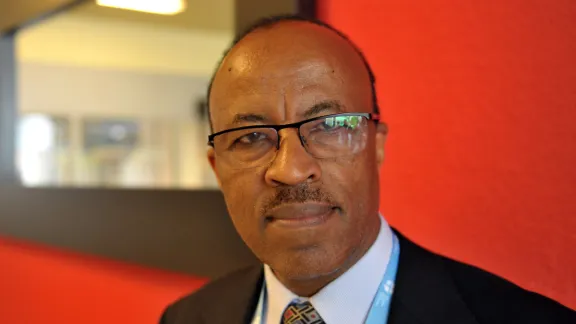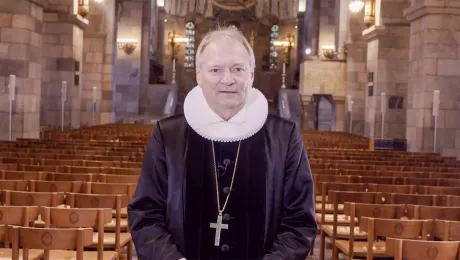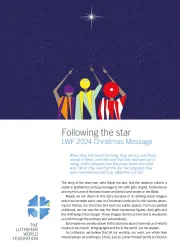
Rev. Yonas Yigezu Dibisa, EECMY President. Photo: LWF/S. Gallay
Interview with Ethiopian church leader Yonas Yigezu Dibisa
(LWI) – The Lutheran World Federation (LWF) largest member church is the Ethiopian Evangelical Church Mekane Yesus (EECMY), which has slightly over 9 million members. In this Lutheran World Information interview, EECMY President Rev. Yonas Yigezu Dibisa talks about training of pastors and other church workers, membership growth, leadership and commemoration of the 500th anniversary of the Reformation.
What makes it special and sometimes challenging to be Lutheran in the Ethiopian context?
What is special is that Lutheranism is founded on a sound doctrine and scripturally grounded theological basis. When you are Lutheran you know what you do and what you say, and why you say it. You have a framework of thought, of doctrinal guideline and also theological directions.
In Ethiopia, the challenges are numerous not only for us but also for other mainline churches. They range from the growing charismatic movements, unsound doctrines, sometimes false teachings, mushrooming of prosperity gospel-oriented sects and many more. Another challenge is to stay true to Lutheranism in the context of the overwhelmingly complex social, political and ideological contexts, including theological ideology.
When it comes to our theology the EECMY is a very conservative church. This means, trying very much to affirm our rooting in everything according to Scripture, and even hermeneutically we tend to be traditional. And from an ecclesiological perspective, we are being challenged. Some ask, “As a mainline church that has been there for more than 120 years, how come you don’t have a bishop?” “Why does episcopacy not work for you?” And, these questions are valid in a country where other mainline churches, small churches and newly emerging churches have bishops, yet we still tend to be like a lay-oriented church.
How do you respond to these questions?
Our response is that we tend to be who we are. We rely on the Scriptures and also on traditions. We are a church that is built on Lutheran tradition which guides our response to any challenge or questions that might arise. These questions do not pose a serious challenge; nevertheless, they are going around.
To what do you attribute EECMY’s steady membership growth—slightly over 9 million members in 2017, compared to 7.9 million at the end of 2015?
Yes, we are growing, and there are three factors that make this possible:
Mekane Yesus is very much discipleship-focused and we take this very seriously. We are evangelical, because we take proclamation of the gospel very seriously, and because we always sow the seed, praying and hoping it will come up. It is our conviction that when we proclaim the gospel of Jesus Christ, somebody will respond to the proclamation. And, those who have come to Christian faith will be made disciples so that they can become disciple makers themselves.
We are evangelical, because we take proclamation of the gospel very seriously, and because we always sow the seed, praying and hoping it will come up.
Secondly, being lay-oriented means that the laity has a big space in our church. A Mekane Yesus member is somebody who is always passionate about Jesus Christ, about the faith, and always prepared to share his or her faith with non-Christians.
Thirdly, we are an African-charismatic church. This means, for example, when we have a liturgy book in our hands, we at the same time allow the Holy Spirit to work. I always say we are very good Lutherans, and we try to be very good Lutherans, but at the same time also try to be an African charismatic church, not charisma that is only noisy but one that is serious about Christian faith, about sharing it with others, about living it out, about Christian faith in action, being the embodiment of Jesus Christ, and being missionary vibrant.
These three factors are interwoven with our sound teachings, reading the Bible, prayers and discipleship movements.
How are you marking the Reformation anniversary in Ethiopia?
We’ve been commemorating Reformation anniversary since late 2015 until today, and we have been teaching what happened 500 years ago. We are also looking at how that applies to our context today. In each of our 29 synods, different congregations are commemorating differently. They have been conducting various events on the Reformation, and on what must actually happen now for a church that has grown out of Reformation thoughts, what Mekane Yesus is doing today, and how it presents itself in the society.
On 26 November, we will hold the Grand Commemoration, which will be attended by LWF President Archbishop Dr Panti Filibus Musa and Vice-President Rev. Dr Jeannette Ada Maina among other international guests. It is important to tell people the contribution of the Reformation movement especially to Africa’s political, economic and social self-awareness and development, and its impact on people’s lives today. These issues will be addressed at a national theological symposium preceding the main event, to be held from 23 to 24 November at the African Union Conference Center at the AU headquarters in Addis Ababa.
At the May 2017 LWF Twelfth Assembly, you were elected to the LWF Council, what are your expectations in this new role?
It is an opportunity to contribute my part in the leadership of the communion and also an opportunity for personal growth. My expectation is at least to provide what I’m able to, conscious of the fact that I also represent LWF’s largest church body. I want to contribute my part so that the Council would be a platform to influence the entire communion, and that the leadership would take into account the current context, both local and global. Whatever that will entail, I want to be a good player.
You recently participated in an LWF roundtable on ministerial formation in Geneva. What did you find inspiring; surprising and why?
It was timely because there are many questions and lots of challenges around theological institutions. Ministerial formation is actually about theological institutions because training cannot happen without these institutions. Although at Mekane Yesus we tend to be conservative in our theological and ecclesiological perspectives, we are looking at models that can be applied to situations where formal training processes are lacking. We have been able to appreciate lay ministers’ past experiences that could be considered when suggesting candidates for the ordained ministry, despite the fact that such individuals would not have acquired the mandatory certificate for a pastor. Such models would be very helpful for emerging churches, smaller churches, and also churches that are growing very fast like EECMY.
Our membership is growing, but we are not moving at the same pace in terms of ministerial formation. We have around 9,000 congregations but only just over 4,000 ordained pastors, although we have more than 10,000 evangelists. We train our theologians and other church workers at the Mekane Yesus Seminary in Addis Ababa, which currently offers a master’s degree in theology, and will launch a PhD program in 2018. In addition, 12 accredited regional seminaries provide a three-year diploma program, five seminaries offer degree courses, and more than 60 Bible schools teach a two-year certificate course.
The round table enabled us to also look closely at how some of our theological institutions are functioning when faced with challenges of sustainability. We suggested some ideas that could be helpful for vulnerable institutions and identified the role of the LWF communion itself in this process. We also talked about networking in order to provide support to each other and meaningfully contribute to the growth and development of our institutions.
Read more about the LWF roundtable on ministerial formation
Discover our Church growth and sustainability program


